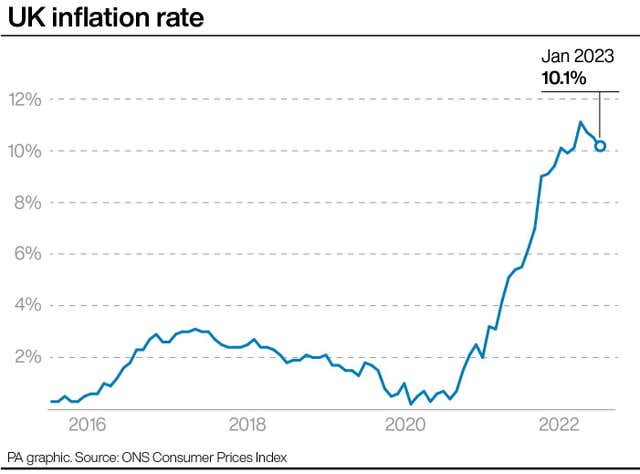UK inflation slowed by more than expected in January to hit a five-month low in a further sign that the cost-of-living crisis has passed its peak, official figures have shown.
The Office for National Statistics (ONS) revealed Consumer Prices Index (CPI) inflation dropped sharply to 10.1% last month – the lowest reading since September last year – from 10.5% in December as lower air fares and fuel costs helped slow down the pace of price rises.
Most economists had been expecting a drop to 10.3% last month.

But with inflation still in double digits and the rate near 40-year highs, households are yet to feel the pressure ease.
The ONS said food price inflation remained at its highest level for 45-years, at 16.8% in January, with the cost of everyday essentials still ramping up.
Chancellor Jeremy Hunt said the battle to reduce inflation is “far from over”.
He said: “While any fall in inflation is welcome, the fight is far from over.
“High inflation strangles growth and causes pain for families and businesses – that’s why we must stick to the plan to halve inflation this year, reduce debt and grow the economy.”
Air fare annual inflation soared to 44.1% in December, but more than halved to 18.4% in January, the figures show.
Road transport fares such as coach travel also declined sharply, with inflation at 5.7%, down from 11.3%, while bus fares also eased, thanks largely to the £2 cap on single bus fares, which came into effect in England from January 1.
Consumer Prices Index including owner occupiers’ housing costs (CPIH) rose by 8.8% in the 12 months to Jan 2023, down from 9.2% in Dec 2022.
CPI rose by 10.1%, down from 10.5%.
➡️ https://t.co/kjbxJTBh6A pic.twitter.com/yVhxCbnrJ8
— Office for National Statistics (ONS) (@ONS) February 15, 2023
Motor fuel prices helped further slow the pace of inflation, with average petrol prices falling 5.9p a litre between December and January to stand at 149.4p per litre last month – the lowest since February 2022.
The latest data also showed a decline in the CPIH measure of inflation recorded by the ONS, down to 8.8% from 9.2% in December.
The Retail Prices Index (RPI) remained unchanged at 13.4% in January.
The Bank of England has said it believes CPI will fall sharply this year, with governor Andrew Bailey recently saying there has been a “turning of the corner” on inflation.
It said this is due to falling fuel prices and as supply chain difficulties have eased, while wholesale energy prices have also dropped significantly since the painful costs seen last year.
The Bank is forecasting inflation to fall to around 4% towards the end of this year.
Grant Fitzner continued: (2/3)
— Office for National Statistics (ONS) (@ONS) February 15, 2023
It raised interest rates from 3.5% to 4% in February and there has been speculation that may have been the last hike due to the lower inflation outlook.
But there may be pressure on the Bank to raise interest rates again in March after official figures on Tuesday showed regular wages rising by 6.7% in the three months to December – a new record outside the pandemic and a worrying sign that inflation may prove stubborn.
And for low income households, price hikes for essentials still remain painfully high.
Sandra Horsfield, an economist at Investec Economics, said: “For low-income households weaker inflation pressures in air fares are of scant comfort, as non-essentials carry a smaller weight in their consumption basket than for those at the higher end of the income distribution.
“Welcome though today’s further fall in inflation is, therefore, the cost-of-living crisis remains very much alive.”
Martin Beck, chief economic adviser to the EY ITEM Club, added that, with the drop in CPI being “heavily influenced by the volatile air fares category and base effects, whether the Bank of England will increase rates again next month is very much still in the balance”.






